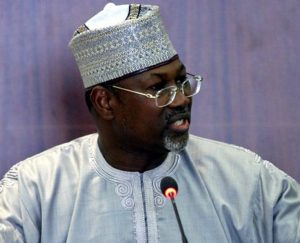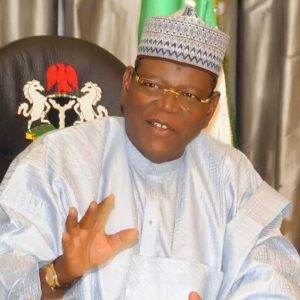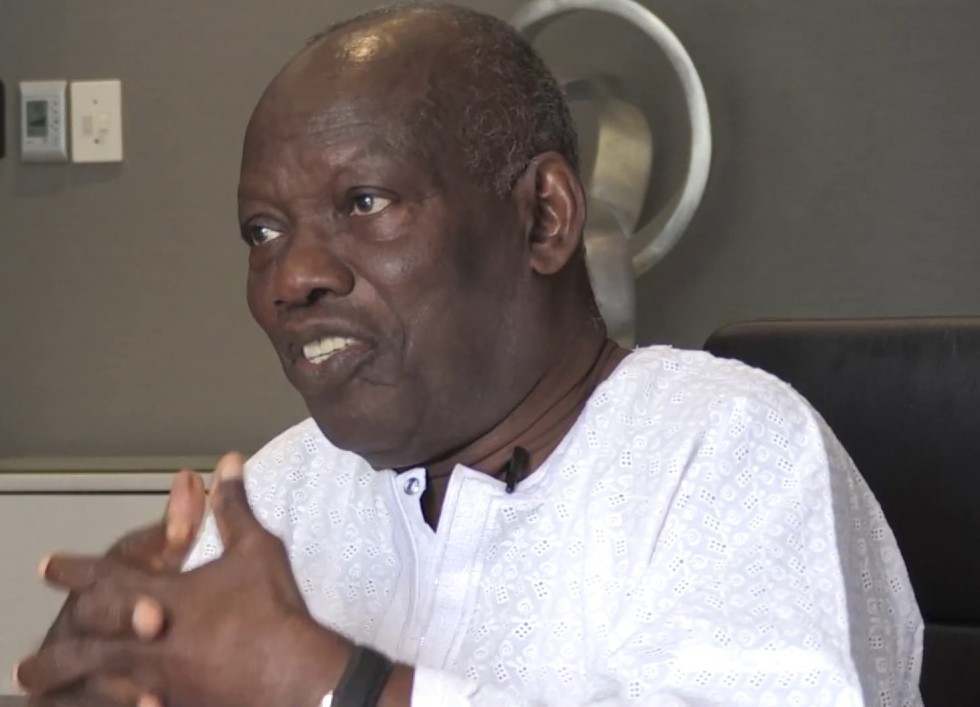Bayero University, Kano’s Prof Attahiru Jega seems to be successfully making a very rapid transition from Political Science to a politician. From formal party membership of the People’s Redemption Party, (PRP) to electoral activism around the recent Electoral Bill to firing a decapitating pot shot on Nigeria’s two leading political parties in the past two decades – the People’s Democratic Party, (PDP) and the All Progressives Congress, (APC), he has been serving an unusually peppery stuff. How far he flies before the buccaneer politicians cut him to size or he retires them all from politics seems to be the emerging spectacle before Nigerians.

Hurricane Jega?
For now, Jega is unfolding against a perspective of “the radical tradition in the North”, that being the reference to the tradition of politics provoked by the Northern Elements Progressive Union, (NEPU) in its critique of the conservatives in Northern Nigeria. The PRP in the Second Republic, 1978/9 – 1983 is basically the NEPU in the First Republic, 1960 – 1966. That perspective popularised by Alhaji Sule Lamido, former Minister of Foreign Affairs and two-term governor of Jigawa State argues that the NEPU-PRP critique of the conservatives in the North has run its course and achieved the liberation of the masses, known in the local lingua of Talakawa. Lamido is fond of saying that, today, it is the children of the masses who went to school fought for them by the radical tradition who are exploiting their class kith and kin.
Lamido would appear to be standing on a similar claim advanced by the Zaria Group made up of Ahmadu Bello University, Zaria based critics of Bala Usman’s politics in the PRP in the early 1980s. They argue that the difficult conditions in terms of famine compounded by inflexible emiral authority and against which the NEPU mobilised the masses in the First Republic no longer existed in 1978 and that Bala Usman’s obsession with concepts such as ‘Northern oligarchy’ was nonsensical. The late Ibrahim Tahir had made a different variant of that argument in a Cambridge University thesis by concluding that the Jihadist aristocracy in the North had been contained by what he calls a commercial revolution that he says had taken place at some point.
In the protest below against the mediated representation of Lamido’s view this time, Prof Jega levels a charge of misrepresentation of the NEPU-PRP by any claim of the end of the struggle as long as systemic injustices prevail. And asserts opportunistic escapism against purveyors of such claim! It makes it all a serious matter in the sense that moral or ethical and ideological legitimacy is being called to question. It is also possible that Jega reads a hagiographical slant to Dr Nurudden’s articulation of the argument. Whichever it is, the NEPU-PRP is not a stranger to internal contestation and rifts or even splits. That is perhaps how it purifies itself and this might be no more than another round!
Jega’s protest is first published, then followed by the piece to which the protest is a response

Dr Nurudden Muhammad
Prof. Attahiru Jega’s Reaction to the Write-up By Dr. Nuruddeen Muhammad, Former Minister of State for Foreign Affairs
I am truly intrigued by this piece written by Dr Nurudeen Muhammad, and feel the need to respond, hopefully to set the record straight.
It is advisable not to misread or misrepresent history and, especially not to misinform the public on what ‘the raison d’etre of NEPU/PRP ideological and political initiatives’ is.
The raison d’etre for the NEPU ideological commitment and political activism is struggle against injustices and unjust system of ruling society and its replacement with justice, respect for human dignity and a just system of governance.
This is why in the aims and objectives of the party when the 8 founding members met on August 8, 1950, the key principle focused on respect, protection and defence of the dignity of the human being.
NEPU’s struggles against the kingship system, which came to dominate the emirates of the former Sokoto Caliphate, was because it personified and legalised injustices and unjust rule, by essentially ascribing the right to leadership in society only to ‘blue blood’ lines of descent, to the exclusion of those defined as the commoners, the ‘talakawa’. Which was contrary to the underlying principles of the jihad itself, which established the emirate system.
The British colonisers, for administrative as well as exploitative convenience, endorsed that unjust system, and condoned the prevailing injustices embedded in it. Hence, NEPU’s struggles had to necessarily, simultaneously, be anti- Sarauta system and anti-colonialism and imperialism, which nurtured and sustained the injustices of Emirs/Kings, many of whose only qualification to community leadership in governance was that they were born into the ruling houses.
Thus, even though the combined NEPU and other nationalists and anti-imperialist movements have displaced leadership and governance by ascription and birth, and opened up popular participation, as well as the ascendancy in leadership and governance by children of the talakawas, so long as injustice and unjust systems continue to rein, NEPU/PRP ideological underpinnings and political activism remain relevant for the struggles for emancipation of the people from unjust rulers regardless of where they come from. So NEPU/PRP struggles are as relevant today as they were then with regards to the fundamental basis of the struggles, which is fighting injustice and unjust systems of governance.
Therefore, regardless of the colour of the blood running in anybody’s veins, if it were to be anything other than red, so long as they are dishonest, ungodly, corrupt, selfish, self-serving, and ‘lead’ unjustly, NEPU/PRP values and struggles remain relevant.
It is opportunistic escapism to misread and misrepresent historical facts, dismiss and make nonsense of the contemporary role of emancipatory movements, tendencies, ideologies and parties, such as PRP.
Everyone has the right to belong to the party of his/her choice. That right should be exercised, without recourse to distortions and misrepresentations, to justify and ‘rationalise’ a selfish and self serving personal decision.”

Alhaji Sule Lamido: controversial position or controversially communicated position?
The New NEPU/PRP Practitioners in Prof Attahiru Jegas & The Old Guards in Sule Lamidos
Dr Nuruddeen Muhammad
Yesterday, Sunday, the 8th of August, 2021, I accompanied His Excellency Dr Sule Lamido, (CON) who was the speaker at a symposium organised by the Aminu Kano Centre for Democratic Studies, Bayero University Kano (Mambayya House) to commemorate the 71st anniversary of the founding of the Northern Elements Progressives Union (NEPU), with the theme; ‘Politics of Principles and the Phenomenon of Political Party Defections in Nigeria’.
The event which held under the distinguished chairmanship of the cerebral Dr Tijjani Muhammad Naniya, also had the ebullient Dr Auwalu Anwar as the sole discussant. While Professor Attahiru Jega, Prof Dandatti Abdulkadir, Dr Hakilu Sani Indabawa, Prof Hafiz Abubakar, Prof Sule Bello, Dr Nasir Fagge, former NEPU/PRP regional, federal and state parliamentarians, women and youth leaders from across the country, notably Kano, Jigawa, Katsina and Kaduna States all ran incisive commentaries.
The cacophony of voices were as fierce as they were sharply different in tone, content and delivery. But by far, that which stood out and generated most responses was Dr Lamido’s lead assertion that the raison d’etre for the NEPU/PRP ideological and political initiatives was to liberate the common folks (the Talakawas), first from the clutches of the combined repression of the colonial overloads and their willing surrogates in the Native Authority establishments in Northern Nigeria, and the restrictions placed on them in political participation, aspirations and freedoms. He forcefully argued that the movements have achieved on both counts as the children of yesterday’s Talakawas are today the new overloads and oppressors who deny their fellow Talakawas quality leadership as presidents, governors, parliamentarians, ministers, council chairmen and their councils. He concluded that the movements (at least as organised political actions) should rest and cease to exist. And that today’s progressives should instead leverage around available political opportunities/platforms to confront the existing selfish order using present day political sentiments and realities as mobilization tools.
But recalling copiously from memory, the lead speaker canvassed for an ideological graft transplant from the NEPU/PRP days in ways that the moral and ethical characters of both politics and governance of today can benefit from the sound value systems of old order. He narrated how he first resigned as a member of the House of Representatives in Lagos in 1983 purely on moral grounds, and then flew to Kano to convince the then Governor Alhaji Abubakar Rimi to do same as the governor of the old Kano State when the duo defected from the People’s Redemption Party (PRP) that gave them the mandates in the first place. He then described the present phenomenon of political party defections in Nigeria as the worst form of corruption.
This profound submission drew a symphony of responses from today’s PRP practitioners who are mostly academics. Leading the park was Prof Attahiru Jega who argued that without justice in leadership and the level of impunity as is the case today, the NEPU/PRP cause has just begun and asked Sule Lamido to come lead the national onslaught. Many other PhDs and Professors joined in the call that Lamido would later say lacked sufficient local and broader national political insight. It is significant to note that I was to totally align myself with the Sule Lamido’s perspective of the argument only yesterday, having engaged with him for over a decade on the same exact topic as the Jegas had done yesterday at Mambayya. I am now fully convinced that the NEPU/PRP politics exclusively represented yesterday’s political sentiments and realities in the North with no much utility for either our present political and social circumstances or broader national appeal.
The Mambayya rendezvous is perhaps the only remaining theatre in Nigeria where political practitioners, activists and ideologues meet political researchers, theorists and even wannabees in a real time intellectual brawl. Bayero University Kano is both creative and thoughtful in this annual ritual. Mallam Aminu Kano and his comrades had lived a very politically active, intellectually robust, and ideologically/philosophically sound lives to deserve this honour.
When academic excellence and classroom sense meet self taught philosophers and the practical hands on the streets, a certain unique flavour emerges. Yesterday’s flavor has unfortunately left a distinctively sour test in my mouth. The fact that the Talaka is today his very own oppressor is a very bitter pill for some of us to swallow. And even more bitter is the second fact that the second on coming liberation of the Talakawas (from themselves this time around) will have to invent it’s devices with no NEPU/PRP emotional relic to rely on.
This, on a very personal note, was a befitting way to round off my three weeks extended sallah visit in Jigawa.
Dr Muhammad was Nigeria’s former Minister of State for Foreign Affairs & Federal Minister of Information




























